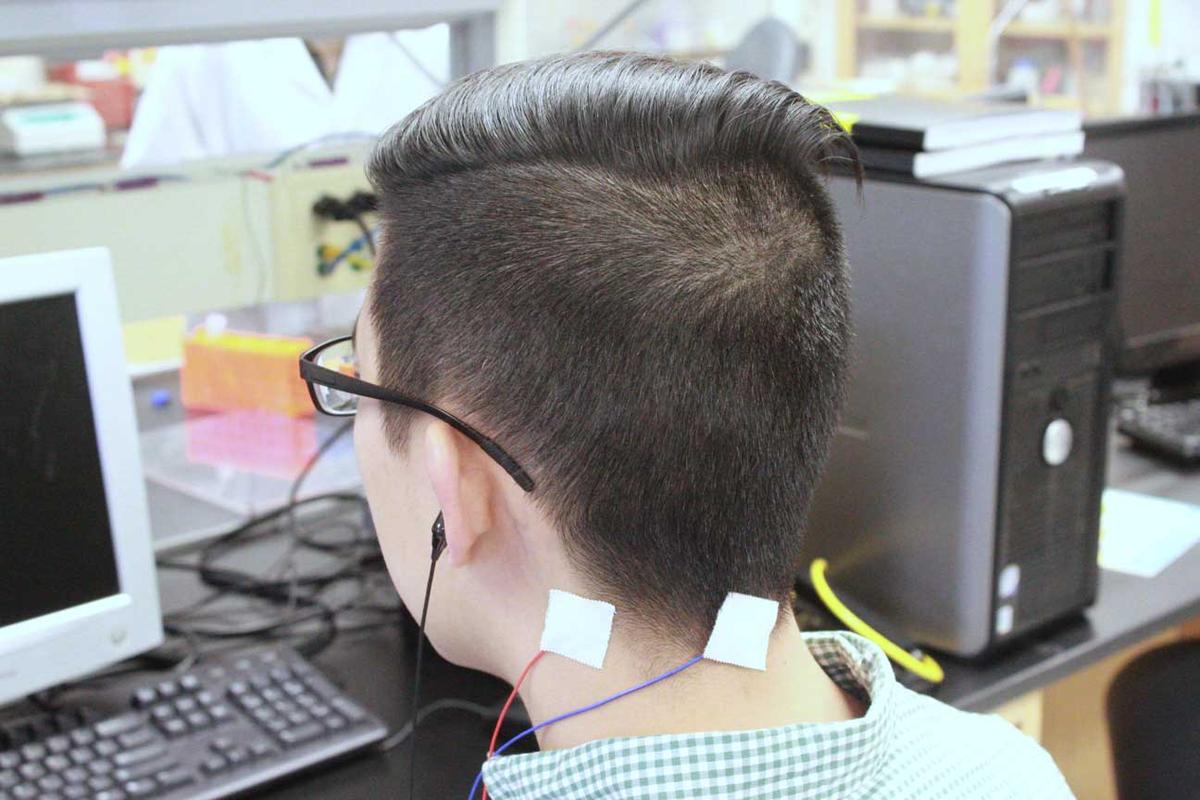It's just a simple pair of earbuds and some stick-on electrodes, but this device could be what millions of people worldwide have been waiting for – an effective treatment for tinnitus. Human trials have shown precisely timed sounds and weak electrical pulses delivered by the device can reduce or even eliminate that ringing in your ears.
Tinnitus, as vast numbers of people will attest, sucks. It's a ringing or rushing sound in one's ears when no sound is present and can be caused or exacerbated by exposure to loud noise. In a silent moment, it'll drive you nuts with its incessant ringing. In a noisy restaurant, it'll make it harder for you to hear a conversation. Just writing about it is making me notice my own tinnitus, and I bet a bunch of you guys reading this are cursing my name for reminding you about yours.
But there's good news. University of Michigan researchers believe they may have worked out the first non-invasive treatment that can reduce tinnitus symptoms, and it uses a pretty fascinating mechanism that slowly trains the ringing out of your ears. The technique doesn't concentrate on any physical damage or deep brain activity that may be associated with tinnitus, but rather, it looks to train out errant nerve activity.
"The brain, and specifically the region of the brainstem called the dorsal cochlear nucleus, is the root of tinnitus," says Susan Shore, the U-M Medical School professor leading the research team. "When the main neurons in this region, called fusiform cells, become hyperactive and synchronize with one another, the phantom signal is transmitted into other centers where perception occurs. If we can stop these signals, we can stop tinnitus. That is what our approach attempts to do."
Fusiform cells perform several valuable functions under normal conditions. They help us locate where sounds are coming from, and help us tune out noises and sensations related to our own head and neck movements.
But after exposure to loud noises, these cells can start behaving aberrantly, messing up their timing so they begin to synchronize their signals and fire without a noise to tune out, which results in a perception of sound where none exists. The team decided to try a bimodal auditory/somatosensory stimulation routine to attempt to reset the behaviour of these cells.
Basically, a totally non-invasive device was developed that could play a sound into the ears that roughly matches the frequency and volume of the tinnitus a patient experiences, and then apply a small electrical impulse to the head. Basically a set of headphones with some electrodes.
Patients were chosen who had the ability to alter the sound of their own tinnitus, making it louder or softer by clenching their jaws, flexing their necks or sticking out their tongues – indicating that they'd worked out ways of changing the activity of fusiform cells by themselves. The electrical pulses were directed to the part of the head each patient was using to change the tinnitus sound.
The researchers found that timing was crucial, and that this timing matched up with tests they'd previously run on guinea pigs. Twenty tinnitus patients had devices tuned to the specifics of their condition, and were trained to go away and perform a daily 30-minute session on the device each day for four weeks. A control group was given a "sham" device that only made the sound, without delivering the electrical pulses.
Patients in the sham group reported no reduction of tinnitus symptoms, but the active group's results were very encouraging. Bimodal treatment recipients on average experienced significantly reduced scores on the 100-point TFI tinnitus quality of life survey.
Some reported up to a 12-decibel reduction of the ringing in their ears, others reported a reduction in harshness or that their tinnitus became less piercing, and two patients reported it was completely gone. Nobody's symptoms got worse, and the effect persisted for at least a few weeks on average.
"We're definitely encouraged by these results," says Shore, "but we need to optimize the length of treatments, identify which subgroups of patients may benefit most, and determine if this approach works in patients who have nonsomatic forms of the condition that can't be modulated by head and neck maneuvers."
It's too early to talk about commercialization, or what the treatment might cost, but it seems like we tinnitus sufferers have a genuine hope of being free from this condition sometime in the coming years.
The team's study appears in the journal Science Translational Medicine.
Source: University of Michigan





